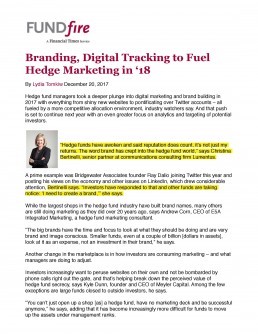Hedge fund managers took a deeper plunge into digital marketing and brand building in 2017 with everything from shiny new websites to pontificating over Twitter accounts – all fueled by a more competitive allocation environment, industry watchers say. And that push is set to continue next year with an even greater focus on analytics and targeting of potential investors.
“Hedge funds have awoken and said reputation does count, it’s not just my returns. The word brand has crept into the hedge fund world,” says Christina Bertinelli, senior partner at communications consulting firm Lumentus.
A prime example was Bridgewater Associates founder Ray Dalio joining Twitter this year and posting his views on the economy and other issues on LinkedIn, which drew considerable attention, Bertinelli says. “Investors have responded to that and other funds are taking notice: ‘I need to create a brand,’” she says.
While the largest shops in the hedge fund industry have built brand names, many others are still doing marketing as they did over 20 years ago, says Andrew Corn, CEO of E5A Integrated Marketing, a hedge fund marketing consultant.
“The big brands have the time and focus to look at what they should be doing and are very brand and image conscious. Smaller funds, even at a couple of billion [dollars in assets], look at it as an expense, not an investment in their brand,” he says.
Another change in the marketplace is in how investors are consuming marketing – and what managers are doing to adjust.
Investors increasingly want to peruse websites on their own and not be bombarded by phone calls right out the gate, and that’s helping break down the perceived value of hedge fund secrecy, says Kyle Dunn, founder and CEO of Meyler Capital. Among the few exceptions are large funds closed to outside investors, he says.
“You can’t just open up a shop [as] a hedge fund, have no marketing deck and be successful anymore,” he says, adding that it has become increasingly more difficult for funds to move up the assets under management ranks.
Some hedge funds are adding marketing efforts as a line item and putting aside $150,000 to $200,000 annually, Dunn says. Analytics and tracking of investor interest has also become more important. If, for example, a potential investor looks at the website biographies of a firm’s top executives multiple times, firms can track that and prioritize who to target their sale efforts to.
“The challenge is you need to communicate with thousands of people now to identify the 50 who are interested,” Dunn says.
Another aspect of the evolving outreach is the emergence of “corporate eminence” and “executive eminence” as buzzwords this year as firms build up their content output with white papers and more opinion pieces, rather than straight investment and product angles, Bertinelli says.
“Executive eminence and understanding the power of the individual and then marketing that – it’s no longer marketing a firm – it’s marketing an individual, a Ray Dalio effect …It’s a trend I see moving forward,” she says.
With thousands of hedge funds to choose from, managers that are not proactive in promoting their firms aren’t going to see assets come in, says Donald Steinbrugge, managing partner at Agecroft Partners, a third party marketer.
“Time is not on hedge funds’ side. If you’re a small hedge fund you need to grow. If five years go by and you’re still small, everybody is going to want to know why and they will use it as an excuse on why not to invest,” he says.
Lumentus
Lumentus is a strategic communications consulting firm that helps its clients manage their brands, protect their reputations and improve their perceptions across target and stakeholder audiences. Lumentus Social is the firm’s social media technology and communications solutions unit, also based in the New York office. The firm’s principals are leading practitioners in the areas of corporate communications, public relations and public affairs, digital reputation management, social media, advertising and branding. Lumentus practices a discipline-agnostic approach that yields dynamic solutions able to continuously reflect changing business demands.
